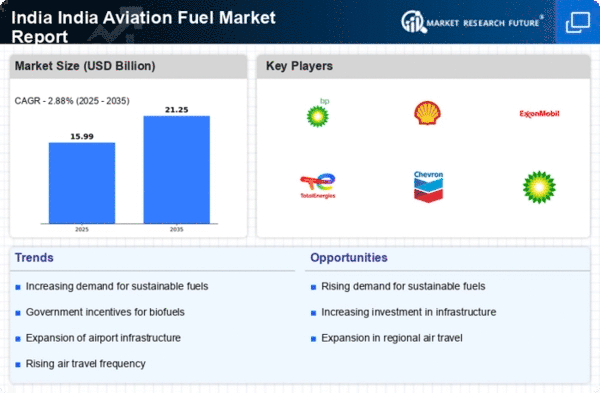Rising Air Travel Demand
The aviation fuel market in India is experiencing a notable surge in demand due to the increasing number of air travelers. With a projected growth rate of approximately 10% annually, the market is expected to expand significantly. This rise in air travel is driven by factors such as economic growth, urbanization, and a burgeoning middle class. As more individuals opt for air travel, airlines are compelled to increase their flight frequencies and expand their fleets, thereby escalating the demand for aviation fuel. The Indian government has also been promoting air travel through various initiatives, which further stimulates the aviation fuel market. Consequently, the interplay between rising air travel demand and the need for efficient fuel supply is likely to shape the future landscape of the aviation fuel market in India.
Infrastructure Development
Infrastructure development plays a crucial role in shaping the aviation fuel market in India. The government has been investing heavily in expanding airport facilities and enhancing connectivity across the nation. With plans to construct over 100 new airports by 2030, the aviation sector is poised for substantial growth. This expansion necessitates a corresponding increase in aviation fuel supply to meet the demands of new and existing airlines. Additionally, improved infrastructure facilitates better logistics and distribution channels for fuel suppliers, ensuring timely delivery and reduced costs. As a result, the ongoing infrastructure development is likely to bolster the aviation fuel market, creating a more robust and efficient supply chain.
International Trade Dynamics
International trade dynamics are increasingly influencing the aviation fuel market in India. As the country engages in global trade, fluctuations in crude oil prices and geopolitical factors can significantly impact fuel costs. For instance, any disruption in oil supply chains can lead to price volatility, affecting the operational costs for airlines. Additionally, India's growing role as a hub for international flights necessitates a stable and reliable supply of aviation fuel. The aviation fuel market must adapt to these external pressures, ensuring that suppliers can respond effectively to changes in global oil markets. Consequently, the ability to navigate international trade dynamics will be crucial for stakeholders in the aviation fuel market, shaping pricing strategies and supply chain management.
Government Policies and Incentives
Government policies and incentives significantly influence the aviation fuel market in India. The Indian government has implemented various measures to promote the aviation sector, including tax exemptions and subsidies for fuel suppliers. These initiatives aim to reduce operational costs for airlines, thereby encouraging more competitive pricing in the market. Furthermore, the introduction of policies aimed at enhancing fuel efficiency and reducing emissions is likely to drive innovation within the aviation fuel market. As airlines adapt to these regulations, the demand for alternative fuels and more efficient fuel types may increase, potentially reshaping the market landscape. Overall, supportive government policies are expected to foster growth and sustainability in the aviation fuel market.
Technological Advancements in Fuel Efficiency
Technological advancements in fuel efficiency are poised to have a profound impact on the aviation fuel market in India. Innovations in aircraft design, engine technology, and fuel formulations are contributing to reduced fuel consumption and emissions. For instance, the adoption of more fuel-efficient engines can lead to a decrease in fuel usage by up to 15%, which is significant for airlines operating on thin margins. As airlines increasingly prioritize sustainability and cost-effectiveness, the demand for advanced fuel technologies is likely to rise. This trend may encourage fuel suppliers to invest in research and development, ultimately enhancing the overall efficiency of the aviation fuel market. The interplay between technology and fuel efficiency is expected to drive competitive advantages for airlines in the coming years.
















